18. Kinh Pháp Cú – Chương 18: Phẩm Cấu Uế – Impurities – Song ngữ
Dhammapada Sutta (The Path of Truth)
Kinh Pháp Cú
English: Bhikkhu Khantipalo & Sister Susanna, 1993
Vietnamese: Thích Minh Châu, 1996
Illustrated Photos: Venerable-mahasi-sayadaw
Compile: Lotus group
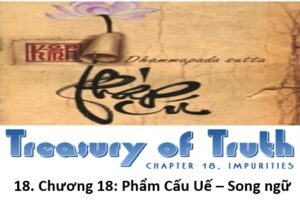
Chapter 18: Mala Vagga – Impurities (Verse 235-255)
18. Kinh Pháp Cú – Chương 18: Giảng Lược Phẩm Cấu Uế – Song ngữ
Verse 235. Man at the Door of Death
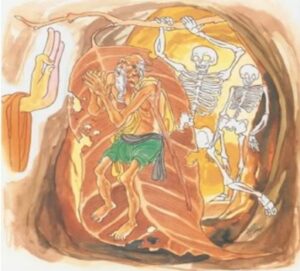
Now a withered leaf is you
And now Death’s men draw near,
Now you stand at the parting gates
But waybread you have none.
“Ngươi nay giống lá héo,
Diêm sứ đang chờ ngươi,
Ngươi đứng trước cửa chết,
Ðường trường thiếu tư lương.”
Explanation:
Like a withered leaf are you now; death’s messengers await you. You stand on the eve of your departure, yet you have made no provision for your journey!
- Ngươi đã giống như ngọn lá khô, Diêm ma sứ giả (tử thần) ở sát bên mình. Ngươi đang đứng trước ngưỡng cửa chết, bước lữ hành ngươi thiếu hẳn lương thực.
Verse 236. Get Immediate Help

Make an island of yourself,
Quickly strive and wise become,
Freed from stain and passionless
To go to the pure Abodes.
“Hãy tự làm hòn đảo,
Tinh cần gấp, sáng suốt.
Trừ cấu uế, thanh tịnh,
Ðến Thánh địa chư Thiên.”
Explanation:
Make an island for yourself! Strive hard and become wise! Rid of impurities and cleansed of stain, you shall enter the celestial abode of the Noble Ones.
- Ngươi hãy tự lo tạo lấy cho mình một hòn đảo an toàn, gấp rút tinh cần làm kẻ khôn ngoan, gột sạch phiền não trần cấu, để bước lên thánh cảnh hàng chư Thiên [8].
Verse 237. In The Presence Of King Of Death
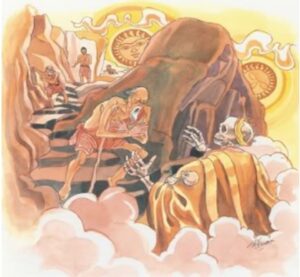
Even now the end draws near,
To the presence of death, you’ve fared.
Along the path’s no place for rest
And waybread you have none.
“Ðời ngươi nay sắp tàn,
Tiến gần đến Diêm Vương.
Giữa đường không nơi nghỉ,
Ðường trường thiếu tư lương.”
Explanation:
Your life has come to an end now; you are setting forth into the presence of Yama, the king of death. No resting place is there for you on the way, yet you have made no provision for your journey!
- Đời sống ngươi sắp lụn tàn, người đang dịch bước đến gần Diêm vương, giữa đường không nơi ngơi nghỉ, bước lữ hành ngươi thiếu hẳn lương thực.
Verse 238. Avoid the Cycle of Existence
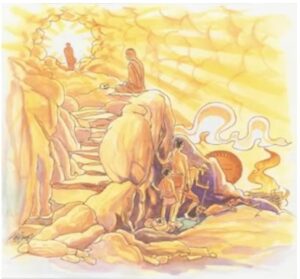
Make an island of yourself,
Quickly strive and wise become,
Freed from stain and passionless
You’ll not return, take flesh, decay.
“Hãy tự làm hòn đảo,
Tinh cần gấp sáng suốt.
Trừ cấu uế, thanh tịnh,
Chẳng trở lại sanh già.”
Explanation:
Make an island for yourself! Strive hard and become wise! Rid of impurities and cleansed of stain, you shall not come again to birth and decay.
- Ngươi hãy tạo lấy cho mình một hòn đảo an toàn, gấp rút tinh cần làm kẻ khôn ngoan, gột sạch phiền não trần cấu, chớ trở lui đường sanh lão nguy nan.
Verse 239. Purify Yourself Gradually
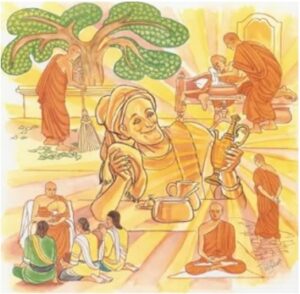
Little by little, time after time,
Successively then let the sage
Blow away all blemishes
Just as a smith with silver.
“Bậc trí theo tuần tự.
Từng sát na trừ dần.
Như thợ vàng lọc bụi
Trừ cấu uế nơi mình.”
Explanation:
One by one, little by little, moment by moment, a wise man should remove his own impurities, as a smith removes the dross from silver.
- Hết sát na nầy đến sát na khác, người trí lo gột trừ dần những cấu uế nơi mình, như người thợ vàng cần mẫn gột trừ cặn bã khỏi chất vàng ròng.
Verse 240. One’s Evil Ruins One’s Own Self
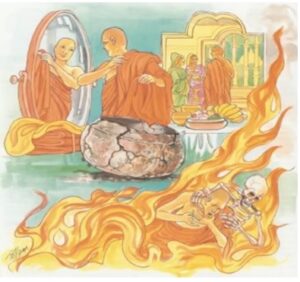
As rust arisen out of iron
Itself that iron eats away,
So kammas done beyond what’s wise
Lead to a state of woe.
“Như sét từ sắt sanh,
Sắt sanh lại ăn sắt,
Cũng vậy, quá lợi dưỡng
Tự nghiệp dẫn cõi ác.”
Explanation:
Just as rust arising from iron eats away the base from which it arises, even so, their own deeds lead transgressors to states of woe.
- Như sét do sắt sinh ra rồi trở lại ăn sắt, ác nghiệp do ngươi gây ra rồi trở lại dắt ngươi đi vào cõi ác.
Verse 241. Causes Of Stain
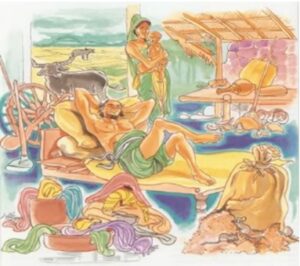
For oral tradition, non-recitation,
in household life, non-exertion,
the fair of form when slovenly,
a sentry’s sloth: all blemishes.
“Không tụng làm nhớp kinh,
Không đứng dậy, bẩn nhà,
Biếng nhác làm nhơ sắc,
Phóng dật uế người canh”
Explanation:
Non-repetition is the bane of scriptures; neglect is the bane of a home; slovenliness is the bane of personal appearance, and heedlessness is the bane of a guard.
- Không tụng tập là vết nhơ của sự học kinh điển, không siêng năng là vết nhơ của nghiệp nhà, biếng nhác là vết nhơ của thân thể và nơi ăn chốn ở, phóng túng là vết nhơ của phép tự vệ.
Verse 242. Ignorance Is the Greatest Taint
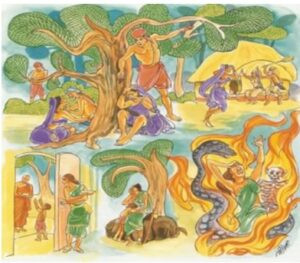
In mankind, conduct culpable,
with givers, avariciousness,
all blemishes these evil things
in this world or the next.
“Tà hạnh nhơ đàn bà,
Xan tham nhớp kẻ thí,
Ác pháp là vết nhơ,
Ðời này và đời sau.”
Explanation:
Unchastity is the taint in a woman; niggardliness is the taint in a giver. Taints, indeed, are all evil things, both in this world and the next.
- Tà hạnh là vết nhơ của người đàn bà, xan lẫn là vết nhơ của sự cúng dường. Đối với cõi nầy hay cõi khác, thì tội ác lại chính là vết nhơ.
Verse 243. Ignorance the Worst Taint

More basic than these blemishes
is ignorance, the worst of all.
Abandoning this blemish then,
be free of blemish, monks!
“Trong hàng cấu uế ấy,
Vô minh, nhơ tối thượng,
Ðoạn nhơ ấy, tỷ kheo,
Thành bậc không uế nhiễm.”
Explanation:
A worse taint than these is ignorance, the worst of all taints. Destroy this one taint and become taintless, O monks!
- Trong các nhơ cấu đó, vô minh cấu là hơn cả. Các ngươi hãy trừ hết vô minh mới trở thành Tỳ kheo thanh tịnh.
Verse 244. The Shameless Life Is Easy
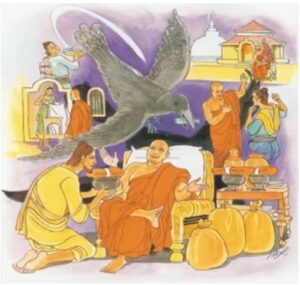
Easy the life for a shameless one
who bold and forward as a crow,
is slanderer and braggart too:
this one’s completely stained.
“Dễ thay, sống không hổ
Sống lỗ mãng như quạ,
Sống công kích huênh hoang,
Sống liều lĩnh, nhiễm ô.”
Explanation:
Easy is life for the shameless one who is as impudent as a crow, is backbiting and forward, arrogant and corrupt.
- Sống không biết xấu hổ, lỗ mãng như quạ diều, sống chê bai kẻ khác, sống đại đởm khoa trương, sống ngạo mạn tà ác, sống như thế chẳng khó khăn gì.
Verse 245. For A Modest Person Life Is Hard
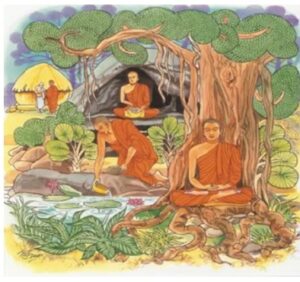
But hard the life of a modest one
who always seeks for purity,
who’s cheerful though no braggart,
clean-living and discerning.
“Khó thay, sống xấu hổ,
Thường thường cầu thanh tịnh.
Sống vô tư, khiêm tốn,
Trong sạch và sáng suốt.”
Explanation:
Difficult is life for the modest one who always seeks purity, is detached and unassuming, clean in life, and discerning.
- Sống biết hổ thẹn, sống thường cầu thanh tịnh, sống không đam mê dục lạc, sống khiêm tốn, trong sạch và dồi dào kiến thức; sống như thế mới thực khó làm.
Verse 246. Wrong Deeds to Avoid
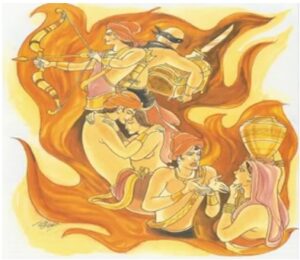
In the world who life destroys,
who words of falsity speaks,
who takes what is not freely given
or to another’s partner goes.
“Ai ở đời sát sinh,
Nói láo không chân thật,
Ở đời lấy không cho,
Qua lại với vợ người.”
Verse 247. Precepts the Lay Person Should Follow
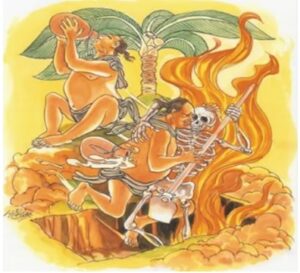
Or has distilled, fermented drinks:
Who with abandon follows these
extirpates the root of self
even here in this very world.
“Uống rượu men, rượu nấu,
Người sống đam mê vậy,
Chính ngay tại đời này,
Tự đào bới gốc mình.”
Explanation:
One who destroys life, utters lies, takes what is not given, goes to another man’s wife, and is addicted to intoxicating drinks – such a man digs up his own root even in this very world.
246 – 247. Trong thế gian nầy, ai hay sát sinh hay nói dối, hay lấy cấp, hay phạm dâm, hay say đắm rượu chè ; ai có các hành vi đó, tức là đã tự đào bỏ thiện căn của mình ngay ở cõi đời nầy.
Verse 248. These Precepts Prevent Suffering
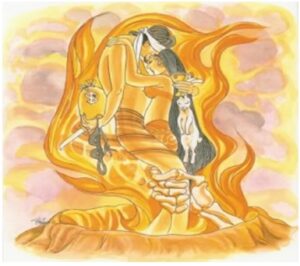
Therefore, friend remember this;
Hard to restrain are evil acts,
don’t let greed and wickedness
down drag you long in dukkha.
“Vậy người, hãy nên biết,
Không chế ngự là ác.
Chớ để tham phi pháp,
Làm người đau khổ dài.”
Explanation:
Know this, O good man: evil things are difficult to control. Let not greed and wickedness drag you to protracted misery.
- Các ngươi nên biết: “Hễ không lo chế ngự tức là ác”. Vậy chớ tham, chớ làm điều phi pháp, để khỏi sa vào thống khổ đời đời.
Verse 249. The Envious Are Not At Peace
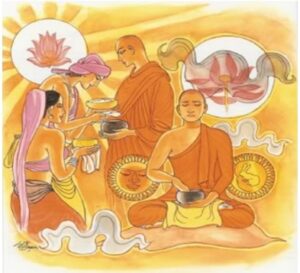
People give as they have faith,
as they are bright with joyfulness.
Who’s troubled over gifts received,
the food and drink that others get,
neither in daytime nor by night
will come to a collected mind.
“Do tín tâm, hỷ tâm
Loài người mới bố thí.
Ở đây ai bất mãn
Người khác được ăn uống,
Người ấy ngày hoặc đêm,
Không đạt được tâm định?”
Explanation:
People give according to their faith or regard. If one becomes discontented with the food and drink given by others, one does not attain meditative absorption, either by day or by night.
- Vì có tâm tin vui nên người ta mới cúng dường, trái lại kẻ có tâm ganh ghét người khác được ăn, thì ngày hoặc đêm kẻ kia không thể định tâm được.
Verse 250. The Unenvious Are At Peace
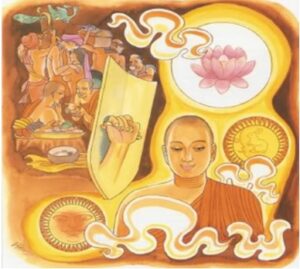
But who has severed envy’s mind,
uprooted it, destroyed entire,
indeed in daytime and by night
will come to a collected mind.
“Ai cắt được, phá được,
Tận gốc nhổ tâm ấy.
Người ấy ngày hoặc đêm,
Ðạt được tâm thiền định.”
Explanation:
But he in whom this (discontent) is fully destroyed, uprooted and extinct, he attains absorption, both by day and by night.
- Những kẻ nào đã đoạn được, nhổ được, diệt được tâm tưởng ấy, thì ngày hoặc đêm, kẻ kia đều được định tâm.
Verse 251. Craving Is The Worst Flood
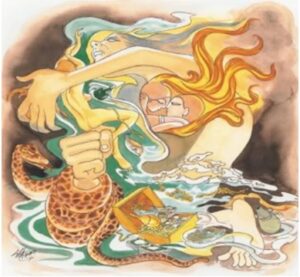
There is no fire like lust,
nought seizes like aversion,
unequalled is delusion’s net,
no river’s like to craving.
“Lửa nào bằng lửa tham!
Chấp nào bằng sân hận!
Lưới nào bằng lưới si!
Sông nào bằng sông ái! “
Explanation:
There is no fire like lust; there is no grip like hatred; there is no net like delusion; there is no river like craving.
- Không lửa nào dữ bằng lửa tham dục, không cố chấp nào bền bằng tâm sân hận, không lưới nào trói buộc bằng lưới ngu si, không dòng sông nào đắm chìm bằng sông ái dục.
Verse 252. Easy To See Are The Faults Of Others
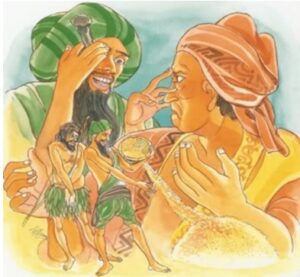
Other’s faults are easy to see
yet hard it is to see one’s own,
and so one winnows just like chaff
the faults of other people, while
hiding away those of one’s own
as crafty cheat the losing throw.
“Dễ thay thấy lỗi người,
Lỗi mình thấy mới khó.
Lỗi người ta phanh tìm,
Như sàng trấu trong gạo,
Còn lỗi mình, che đậy,
Như kẻ gian dấu bài.”
Explanation:
Easily seen is the fault of others, but one’s own is difficult to see. Like chaff one winnows another’s faults, but hides one’s own, even as a crafty fowler hides behind sham branches.
- Thấy lỗi người thì dễ, thấy lỗi mình thì khó. Lỗi người ta cố phanh tìm như tìm thóc lẫn trong gạo ; còn lỗi mình ta cố che giấu như kẻ cờ gian bạc lận thu giấu quân bài.
Verse 253. Seeing Others’ Faults
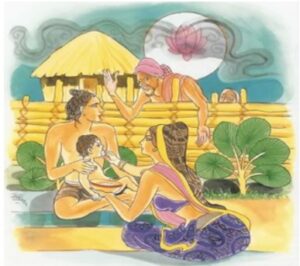
Who’s always seeing other’s faults,
taking offence, censorious,
pollutions spread for such a one
who’s far from their exhaustion.
“Ai thấy lỗi của người,
Thường sanh lòng chỉ trích,
Người ấy lậu hoặc tăng,
Rất xa lậu hoặc diệt.”
Explanation:
He who seeks another’s faults, who is ever censorious – his cankers grow. He is far from destruction of the cankers.
- Nếu thấy lỗi người thì tâm ta dễ sanh nóng giận mà phiền não tăng thêm, nếu bỏ đi thì phiền não cũng xa lánh.
Verse 254. Nothing Is Eternal Other Than Nibbana
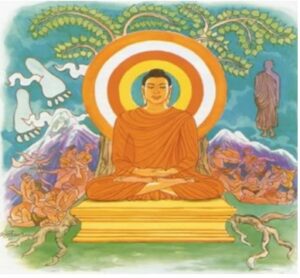
In skies above there is no path,
no peaceful one’s without,
in manifoldness do folk delight,
Tathagatas are manifold-free.
“Hư không, không dấu chân,
Ngoài đây, không sa môn,
Chúng sanh thích hý luận,
Như lai, hý luận trừ.”
Explanation:
There is no track in the sky, and no recluse outside (the Buddha’s dispensation). Mankind delights in worldliness, but the Buddhas are free from worldliness.
- Giữa hư không thì làm gì có dấu vết, trong ngoại đạo thì làm gì có Sa môn. Chúng sanh thì thích điều hư vọng [9], mà Như Lai làm gì còn hư vọng.
Verse 255. The Buddha Has No Anxiety
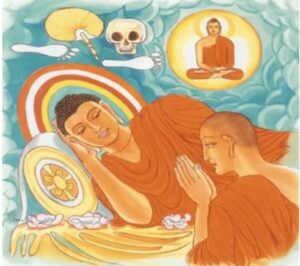
In skies above there is no path,
no peaceful one’s without,
nothing conditioned ever lasts,
no Buddha’s ever shaken.
“Hư không, không dấu chân,
Ngoài đây, không sa môn.
Các hành không thường trú,
Chư Phật không giao động.”
Explanation:
There is no track in the sky, and no recluse outside (the Buddha’s dispensation). There are no conditioned things that are eternal, and no instability in the Buddhas.
- Giữa hư không thì làm gì có dấu vết, ngoại đạo thì làm gì có Sa môn, năm uẩn thì không thường trú, mà Như Lai thì chẳng loạn động bao giờ.
Chú thích:
[8] Thánh cảnh chư Thiên: Chỉ cho 5 cõi trời Tịch cư (Panca Anddhvasabhumi): Vô phiền (A-viha), Vô nhiệt (Atappa), Thiện hiện (Suddassa), Thiện kiến (Suddssi), Sắc cứu cánh (Akanittha) là năm chỗ của hàng A na hàm ở.
[9] Hư vọng : Nguyên văn là Papanca, gồm có nghĩa hư vọng và chướng ngại. Ở đây đặc biệt chỉ cho Ái (Tanha), Kiến (Ditthi), Mạn (Manno)
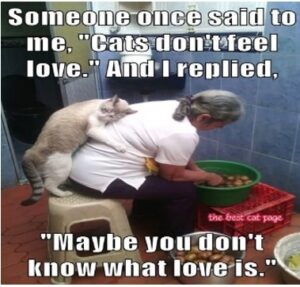
Sources:
Tài liệu tham khảo:
- http://thanhtruc-thanhtrucgdth.blogspot.com/2011/02/kinh-phap-cu.html
- http://www.buddhanet.net/dhammapada/d_impure.htm
- https://www.pinterest.com/pin/57913545186121393/
- Tam Tu Metta Buddhist Temple & Heritage Garden – 610 Fisher Ave, Morgan Hill, CA 95037
- https://quangduc.com/a29858/kinh-phap-cu-chu-giai-tap-3
